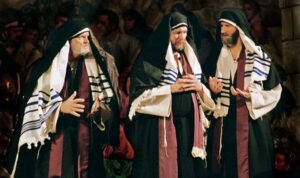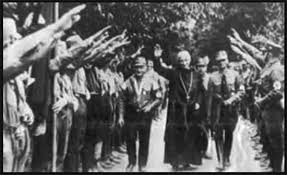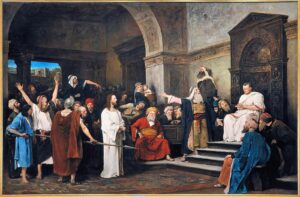These are the short (by Orthodox standards) daily services sung regularly in monasteries at certain “hours” – First Hour (dawn), Third Hour (9 a.m.), Sixth Hour (Noon), Ninth Hour (3 p.m.). Before certain great feasts they are appointed also for parish churches. Some parishes read them throughout the day at the appointed monastic times. I believe most parishes read all four of them in sequence in the morning, in which case they make one quite long service.
Why are they called “Royal” Hours? It’s a nickname, given because on Holy Friday the Emperor (or Tsar, or by whatever title in each country) and his family and entourage would attend. Apparently those days are over now.
These Royal Hours center on four Old Testament readings (prophecies of the Passion of Christ), four Epistles (commentaries on the Passion of Christ), and then the entire Gospel story of the Passion of Christ is read four times: First Hour, according to Saint Mark; Third Hour, Saint Matthew, and so on. Yes, we hear it all again!
If you don’t come to the Royal Hours, sometime (Holy Friday is a good time) take out your Bible and read for yourself the four Gospel accounts of this blessed Week. It is a powerful story. You’ll be glad you did.
Some Lessons we can learn from Holy Week
1. The danger of blind zealotry for the nation
Let’s dig more deeply into the story from last weekend’s Blog.
Why did the scribes, pharisees and priests arrange the execution of Jesus of Nazareth? Try to look at it from their point of view.

They didn’t intend to kill their Messiah. Of course not. They were not wicked. * They were blind. They were sure Jesus was not the Messiah. Why? Because He did not fulfill the Old Testament prophecies that spoke of His coming in glory to save the nation of Israel. The nation was oppressed, occupied by the Romans. They wanted the Messiah to kick the enemy out and “redeem Israel”. The prophets had spoken clearly about this. And Jesus wasn’t doing it.
- except Matthew (27:18) mentions that they delivered Him up to Pilate “out of envy”. Well, He had made them look stupid.
Because they were so focused on that, they ignored the rest of the prophecies. One example out of many: the “Suffering Servant” in Isaiah 57:
He was oppressed and He was afflicted,
Yet He opened not His mouth;
He was led as a lamb to the slaughter,
And as a sheep before its shearers is silent,
So He opened not His mouth.
He was taken from prison and from judgment,
And who will declare His generation?
For He was cut off from the land of the living;
For the transgressions of My people He was stricken.
And they made His grave with the wicked—
But with the rich at His death,
Because He had done no violence,
Nor was any deceit in His mouth.
They were blind also to all the prophecies that He would come not only to Israel but for the world – beginning with God’s promise to Abraham that he would be “father of many nations” Genesis 17 . Even old Simeon understood it: when the Baby Jesus was brought to the Temple he called Him “a Light to lighten the Gentiles” and then secondarily “the glory of Your people, Israel.”
So in their blind zeal for their nation, they could not see the One who was “in their midst”, and they believed they had a moral obligation to stop to this “false messiah”, lest He (or “he”, as they believed) start an uprising and the Romans move in and destroy their nation. “Better one man die than that the nation be lost.”
It is dangerous, brothers and sisters, to read only the parts of the Scriptures that we like, or only part of the Faith, and ignore the rest..
And so, as we said earlier this Week, in the end it was not He but rather they who caused the nation they loved so much to be lost. In that way only, I feel sorry for them.
2. The great danger of blind religious zealotry
Note carefully: It was the religious leaders, not the politicians, who plotted Jesus’ death. Pontius Pilate the governor didn’t want to do it. “Why, what evil has He done?” he would ask on Holy Friday. But the Jewish religious leaders pushed, manipulated Pilate into executing Him.
Dr Samuel Johnson said, “Patriotism is the last refuge of scoundrels.” No, it is not! Patriotism is next to last. Religion is the last refuge of scoundrels. True religion is, of course, the source of enormous good: hope and holiness, joy and consolation, meaning for life and great charitable work. But we have seen for centuries, we see today what horrible things can be done in the name of religion.

Because religion, the quest for the Ultimate, is the highest of all things on earth, it can do the greatest good. But when it goes bad it becomes demonic and can do the greatest evil.
Religious leaders of many kinds have either done great evil or ignored great evil – for the sake of what? the religious institution? its position? its power? preserving their own position? their own power? Like the Jewish authorities of our Lord’s time, rarely do they intend to do evil. The problem is that religious leaders are often so sure, so sincerely certain they [we] are right – that their [our] will is God’s will, their [our] ideas are the truth – that they [we] can be blind to anything else. You see what it can lead to, both 2000 years ago and today, if religious leaders have lost their way.
One of my favorite pieces of advice is that 1960s slogan: “Question authority”. Not with blind doubt, of course. Authorities, of whatever sort, are often right. But if the Jews 2000 years ago had questioned what their authorities said about Jesus… what might the world be like today if they had believed in Him?
Question political authorities, of course, but also question religious authorities. Not only the rich preachers on TV, not only the priests who use their position to steal or do horrible things to youth and their duplicitous superiors who cover up for them. Also question your own priest and your bishop and your archbishop. Gently, gently, please, not in a nasty way. You might be wrong. But clergy also can be wrong, and humility requires that they accept questioning. Furthermore, definitely question the author of this Blog and what I write. I might be wrong, and if you think I am, please let me know it before I go spreading falsehood and foolishness. The Orthodox Church does not expect blind obedience of her members.
Orthodox Christians, this is your obligation, for we are not an authoritarian “top-down” Church. All Orthodox people are guardians of the Faith and of the Church. So if you ever think any of us in positions of leadership in the Church are out of line, misusing our authority, do not let us get away with it.
3. The much greater danger of religion aligned with political power
Now, of course religion should influence politics. This can lead to great social good: Byzantium the greatest of empires, the abolition of slavery, Martin Luther King and racial justice, and much more.

However, if religious authority and political power become enmeshed so they can’t be distinguished from each other – be afraid, be very afraid.
Some other time we’ll look at a contemporary phenomenon often called “American Christian Nationalism”.
Religion combined with politics can lead to Christian emperors destroying icons, to the Crusades, to the Inquisition, to the 100 Years War, to Isis, to what has been done to Jews, and now to the Palestinians, and Syrians – to our very Orthodox Vladimir Putin who in Holy Week 2018 threatened the West with a new ICBM nicknamed “Satan 2” (!), and (I keep mentioning, so we won’t ever ignore it) what he is doing now to Orthodox Ukraine with the blessing of his Patriarch Kirill who has formally turned it into an [un] holy war.
Mr Putin and Patriarch Kirill should spend Holy Week by taking a closer look at Jesus, the real Jesus. So should we.
Do we see Him this Week leading an army? taking over the government? On Friday morning Pontius Pilate will say to Him: “So you are a King then?” Jesus will answer, “You have said it… but my Kingdom is not of this world.”
Did you know: Because religion with political power is so dangerous, the Orthodox Church does not allow clergy to hold political office, and even from holding “partisan membership”. * Our chief work is not to compel but to convince, convert, win people to Christ and His way of love.
- although we are allowed to hold our opinions!
Forgive me for harping on Russia again, but as of 2012 “The governing body of the Russian Orthodox Church has allowed clerics to run for elected office ‘in the event of ecclesiastical necessity'” – without defining exactly what that means. Radio Free Europe
Just in passing, I think the Byzantine Empire had the ideal relationship – in theory, if not always in practice. The emperor took care of “secular” matters, running the empire, providing for the military and for social services, etc. The Church alone was responsible for her internal matters: worship, theology, moral and ethical teaching. It worked well when both sides behaved themselves. I also think the United States has a good system, under the circumstances. Religion and its social/moral teachings are valued, but it does not control the government, and it is free from government interference.
Back now to the story (if you can bear it):

The Jewish authorities therefore decided the only way to get rid of this Man was to violate their own God-given Law: “Have nothing to do with a false charge and do not put an innocent or honest person to death, for I will not acquit the guilty.” Exodus 23:7 When Pilate wanted to release Him, they decided it was better then to bear false witness (thereby violating the Ninth of the Ten Great Commandments): “If you let this Man go, you are not Caesar’s friend. Whoever makes himself a king speaks against Caesar.” And when Pilate asked, “Shall I crucify your king?”, they concluded it was better to violate the First Commandment and blaspheme their God than that the nation be lost. It was the priests, I’m sorry to say, who cried “We have no king but Caesar”.
“The ends justify the means.” And it worked. Briefly.
And so it was because of them – who so dearly loved their nation – that their nation was lost.
The people trusted their religious leaders (as people almost always do) and rejected their Messiah without knowing what they were doing.
Jesus had foreseen it and the result: “The Kingdom will be taken away from you and given to a nation that will bear the fruits of it” – the Church.
Years later Saint Paul would write: “For if God did not spare the natural branches, He will not spare you either.” Romans 11:21 If God did not spare the Jews when they were unfaithful, what do you think will happen to us who have been only grafted on? to us if we are blind? unfaithful? if we misuse the Church and twist our holy religion to our own ends?
Later this afternoon: Holy Friday afternoon Vespers of Holy Saturday. We’ll look at “The True Source of Power”.